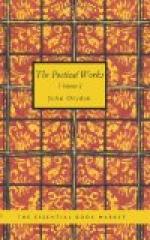And are but satires to set up ourselves.
I, who have all this while been finding fault,
Even with my master, who first satire taught;
And did by that describe the task so hard,
It seems stupendous and above reward;
Now labour with unequal force to climb
That lofty hill, unreach’d by former time;
’Tis just that I should to the bottom fall, 280
Learn to write well, or not to write at all.
* * * * *
FOOTNOTES:
[Footnote 50: ‘Mulgrave:’ Sheffield, Duke of Buckingham. It was for this satire, the joint composition of Dryden and Sheffield, that Rochester hired bravoes to cudgel Dryden.]
[Footnote 51: ‘Armstrong:’ Sir Thomas Armstrong, a notorious character of the time—hanged at Tyburn.]
[Footnote 52: ‘Carr:’ Sir Carr Scrope, a wit of the time.]
[Footnote 53: ‘Beastly brace:’ Duchess of Portsmouth and Nell Gwynn.]
[Footnote 54: ‘Earnely:’ Sir John Earnely, one of the lords of the treasury.]
[Footnote 55: ‘Aylesbury:’ Robert, the first Earl of Aylesbury.]
[Footnote 56: ‘Danby:’ Thomas, Earl of Danby, lord high-treasurer of England.]
[Footnote 57: ‘Merriest man alive:’ Anthony Ashley Cooper, Earl of Shaftesbury.]
[Footnote 58: ‘Nokes and Lee:’ two celebrated comedians in Charles II.’s reign.]
[Footnote 59: ‘New earl:’ Earl of Essex.]
[Footnote 60: ‘Tropos:’ Sir William Scroggs. See Macaulay.]
[Footnote 61: ‘Ned Howard:’ Edward Howard, Esq., a dull writer. See Butler’s works.]
[Footnote 62: ‘Sid:’ brother to Algernon Sidney.]
[Footnote 63: ‘Hewet and Jack Hall:’ courtiers of the day.]
[Footnote 64: ‘Killigrew:’ Thomas Killigrew, many years master of the revels, and groom of the chamber to King Charles II.]
[Footnote 65: ‘Bessus:’ a remarkable cowardly character in Beaumont and Fletcher’s play of ‘A King and no King.’]
* * * * *
ABSALOM AND ACHITOPHEL.[66]
TO THE READER.
It is not my intention to make an apology for my poem: some will think it needs no excuse, and others will receive none. The design I am sure is honest: but he who draws his pen for one party, must expect to make enemies of the other. For wit and fool are consequence of Whig and Tory; and every man is a knave or an ass to the contrary side. There is a treasury of merits in the Fanatic church, as well as in the Popish; and a pennyworth to be had of saintship, honesty, and poetry, for the lewd, the factious, and the blockheads: but the longest chapter in Deuteronomy has not curses enough for an Anti-Bromingham. My comfort is, their manifest prejudice to my cause will render their judgment of




